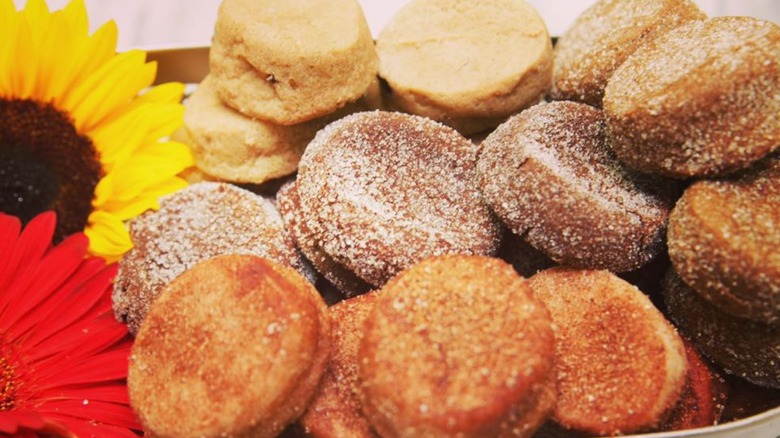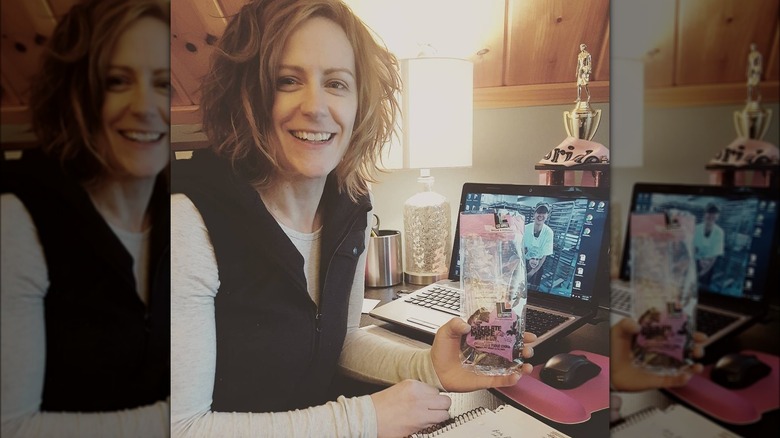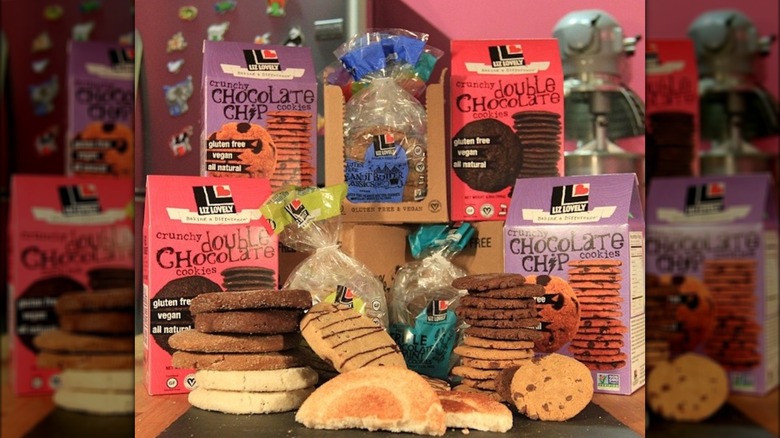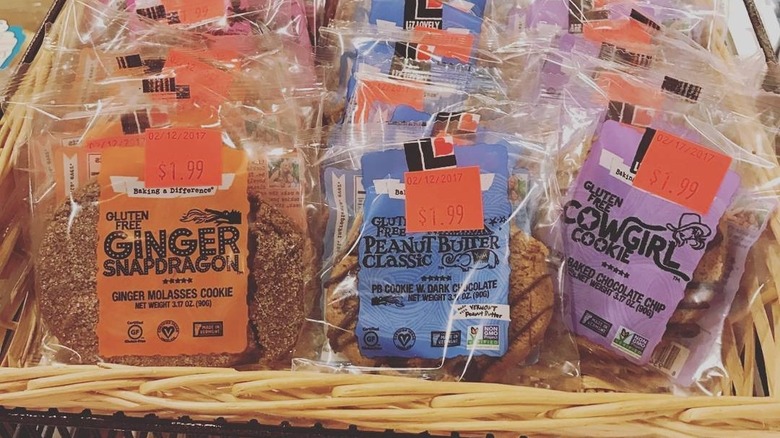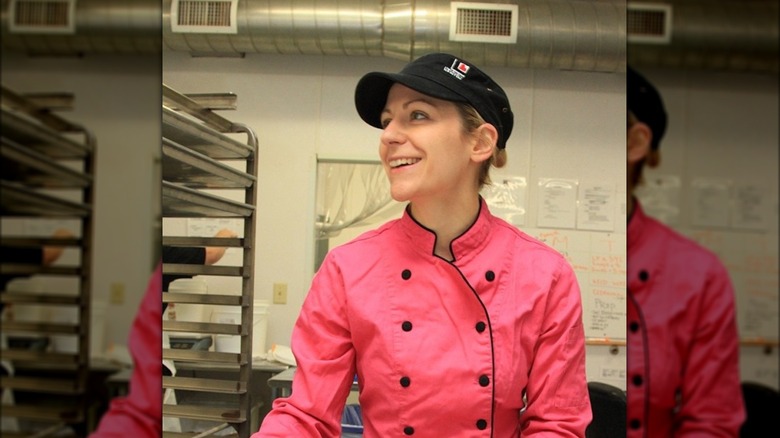Liz Lovely Cookies: Here's What Happened After Shark Tank
When Dan Holtz and Liz Scott appeared on Season 4, Episode 3 of "Shark Tank" in 2012 with their company Liz Lovely Cookies, the couple were hoping to appeal to the sweet side of Mark Cuban, Kevin O'Leary, Barbara Corcoran, Daymond John, and Robert Herjavec. Holtz and Scott founded Liz Lovely Cookies in 2003 to sell their special brand of all-natural, vegan, and gluten-free cookies. The inspiration came when the pair had fallen on hard times, as both were laid off from their web development jobs after the dot-com bubble burst.
Scott, who was vegan at the time, started baking cookies to share with loved ones, and they were an instant hit. She and Holtz soon realized they had a legitimate business opportunity on their hands. With Scott focused on baking and Holtz committed to sales and marketing, the company began to take shape. The first sellers were Whole Foods and the distributor United Natural Foods.
Fresh, soft, cookies made in flavors including ginger, peanut butter, chocolate chip, chocolate fudge, oatmeal raisin, spicy Mexican chocolate, lemon poppyseed, snickerdoodles, and more were the cornerstone of the business. Shelf-stable, thin, and crunchy cookies followed later on, as did chocolate-dipped cookie truffles. At the time when the Liz Lovely Cookies appeared on "Shark Tank," they were only selling the soft varieties.
The path to Shark Tank
The couple moved their operation and home from Philadelphia to Vermont in 2004 where they benefited from a culture that valued artisan foods and a community that was invested in supporting small businesses. The first several years of their business focused on local distribution at various health food stores.
The next step was to set up their own retail shop in Waitsfield, Vermont. But, in 2011, Liz Lovely Cookies faced an enormous setback as Hurricane Irene destroyed their new store and bakery, including their entire Liz Lovely inventory (nearly $20,000 worth), just days before the grand opening. Still, the tenacious entrepreneurs persevered. They were near financial ruin, but they got creative and started selling their products directly to consumers online. Doing so, they managed to get out enough product to meet orders that year.
The company was also bolstered by investments from friends, families, and local organizations like the Flexible Capital Fund, which, among other things, "invests in growing Vermont companies that fill a gap, or strengthen the supply chain in sustainable agriculture and food systems." The couple was feeling optimistic about the future of Liz Lovely Cookies and needed the Sharks to take their business to the next level.
What happened to Liz Lovely Cookies on Shark Tank?
Dan Holtz and Liz Scott confidently strode into "Shark Tank" asking for $200,000 in exchange for 10% equity in Liz Lovely Cookies. Their pitch discussed how the high-quality cookies did not include dairy, eggs, wheat flour, or butter. Instead, these treats were made with a rice flour blend in lieu of a wheat-based dough. As the Sharks tasted the samples, Mark Cuban, Barbara Corcoran, and Robert Herjavec all enjoyed them, but Kevin O'Leary was skeptical given the lack of staple baking ingredients, stating he would only eat these if given no other choice.
The numbers behind Liz Lovely Cookies looked decent to the panel. The previous year's sales came in at $1 million, but even so, the company only made 10% profit. The founders further explained that the cost to make a two-pack of cookies was about $1 with a retail price of $3.99 to $4.99, and the majority of Liz Lovely Cookies' business came from selling wholesale.
Daymond John bowed out of making an offer since he did not love the product. Corcoran thought the company needed a loan more than an investment, and Herjavec was unconvinced by the business strategy, and they too were out. Unsurprisingly, O'Leary also decided not to invest. In a surprise twist, Mark Cuban told the pair to make him a new offer. Holtz and Scott doubled the equity offer to 20%. Still, Cuban declined, and Liz Lovely Cookies left without a deal.
Liz Lovely Cookies after Shark Tank
Apparently, the equity figure that Mark Cuban had in mind was 33%, and the revised 20% offer from Liz Scott and Dan Holtz was just too low for the Shark. In their post-pitch interview that aired during the episode, Scott explained that she was most disappointed that the Sharks did not seem to fully understand their company and who they were as individuals. It did not help that some on the panel had harsh words for the cookies as well.
Even so, Liz Lovely Cookies was able to leverage its "Shark Tank" exposure and the founders' experience to borrow some of the funds it needed. Soon, the company was also selling cookies in Wegmans, Safeway, and Amazon, as well as their previous Whole Foods and health food store accounts.
However, the business still found itself in a challenging financial situation after "Shark Tank." There was significant demand to continue growing their business, but they were not able to meet it, producing a total catch-22. Scott and Holtz explained to the Burlington Free Press that Liz Lovely Cookies needed to increase production to better leverage overhead and bring in more revenue to fund the expansion. However, they could not meet that demand at the current capacity. Without investing in machinery improvements to increase sales, that cash in hand was out of reach. It also proved to be unattainably expensive to meet the production standards required by retailers like Whole Foods.
Is Liz Lovely Cookies still in business?
Liz Scott and Dan Holtz divorced in 2014, putting the future of Liz Lovely Cookies in jeopardy. Holtz filed for bankruptcy in 2015, but Scott tried to keep the business going. However, similar to other cookie-minded "Shark Tank" hopefuls The Cookie Kahuna and Nui, Liz Lovely Cookies crumbled. In June 2017, Scott explained to sellers that the cookies would be back later that year, but that was the last heard from her. She abruptly stopped responding to inquiries, and within months, all communication channels went offline. The last Instagram post was in February 2017. Speaking about the final days, Scott told the Burlington Free Press, "It wasn't tidy."
Despite reaching $2 million in sales and employing 24 people, the debt held by Liz Lovely Cookies got to be too much. After filing for bankruptcy, more than $630,000 went unpaid. The demise of the company hit Scott hard, especially since she really believed in the product. "I have had to let it go even though I would have preferred not," she told Burlington Free Press.
Scott and Holtz both remarried and moved on from the cookie business, but the product definitely impacted fans. One commented on an Instagram post as recently as 2023 saying, "I've been searching for years to find these cookies again. So sad they are not made anymore. These tasted better than anything else out there." Another pleaded, "I know it's been years, but any chance you'd ever bake again?"

